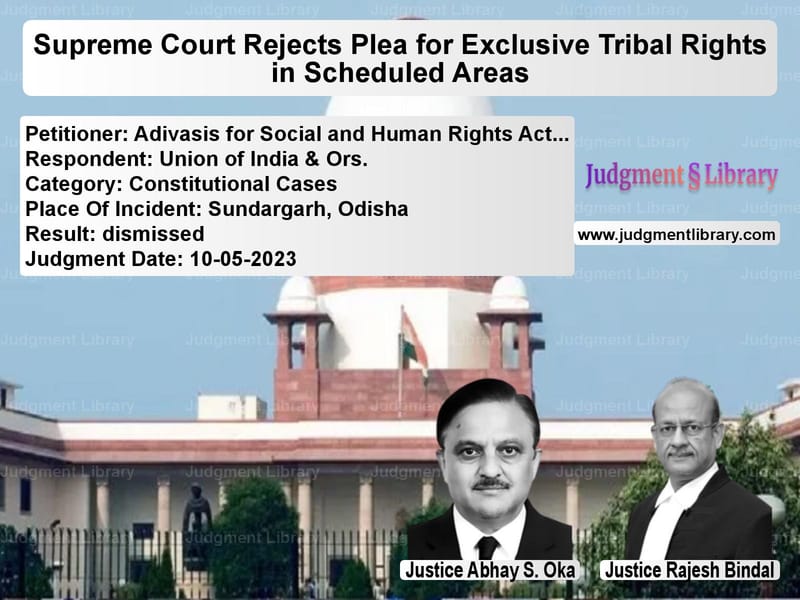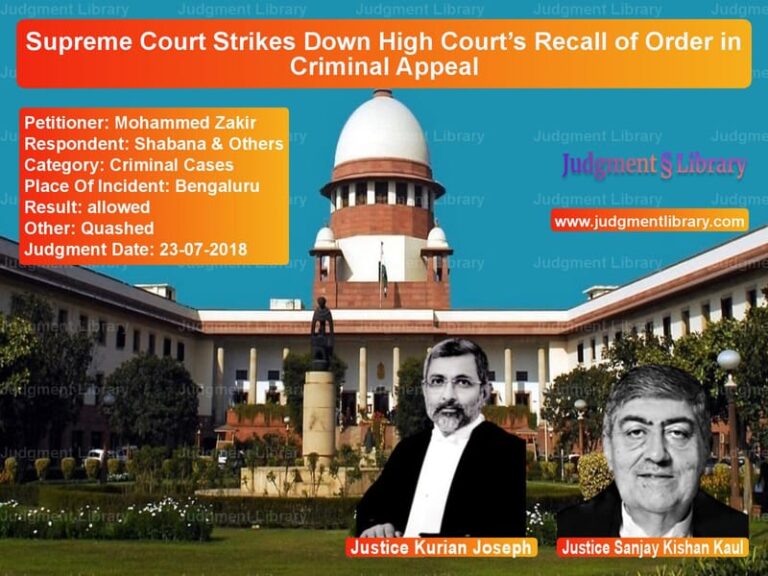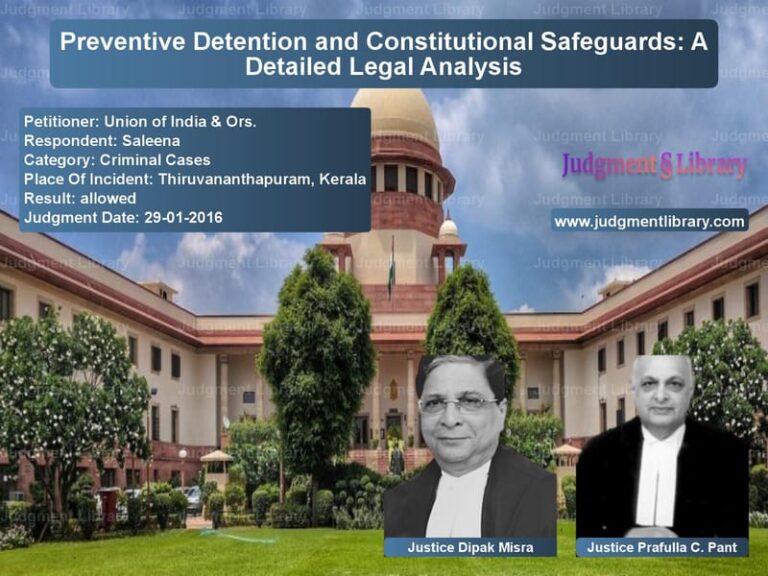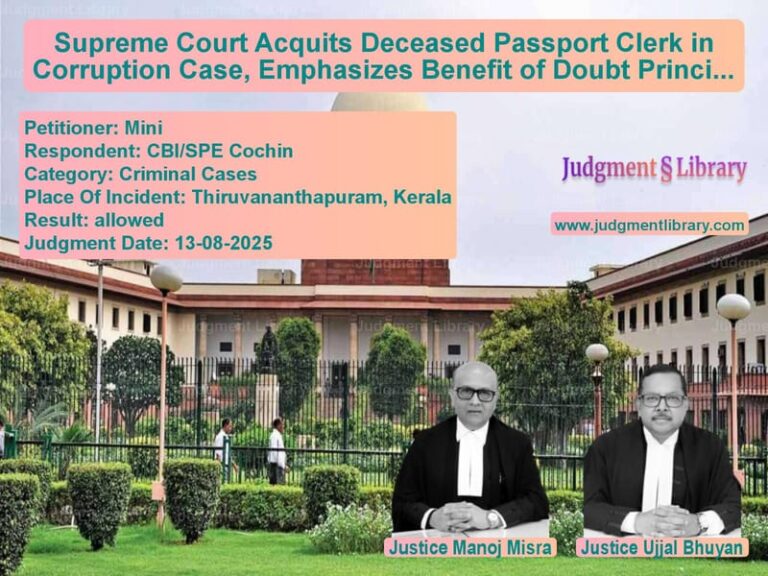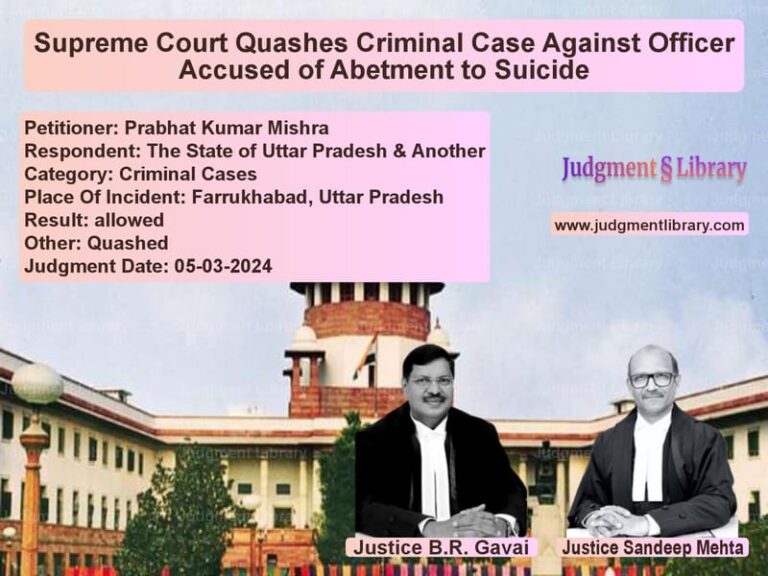Supreme Court Rejects Plea for Exclusive Tribal Rights in Scheduled Areas
The Supreme Court of India, in the case of Adivasis for Social and Human Rights Action vs. Union of India & Ors., delivered a significant judgment on the legal status of Scheduled Areas under the Fifth Schedule of the Constitution. The case revolved around the question of whether non-tribals should be allowed to reside and vote in Scheduled Areas and whether all constituencies within such areas should be reserved exclusively for Scheduled Tribe (ST) candidates. The Court dismissed the appeal, affirming that fundamental rights under Article 19 of the Constitution apply equally to Scheduled Areas.
Background of the Case
On December 31, 1977, the President of India declared the entire Sundargarh District in Odisha as a Scheduled Area under Clause 6(2) of the Fifth Schedule of the Constitution. The appellant, an organization advocating for tribal rights, filed a writ petition in the Orissa High Court under Article 226 of the Constitution, arguing that:
- Non-tribals residing in Scheduled Areas were unlawful occupants and should not have voting rights.
- All constituencies within Scheduled Areas should be reserved for Scheduled Tribes.
- Only tribal candidates should be allowed to contest elections in Scheduled Areas.
- Unless a specific notification was issued by the Governor, no Central or State laws should be applicable in Scheduled Areas.
The Orissa High Court dismissed the petition, leading to the appeal before the Supreme Court.
Legal Issues Considered
The Supreme Court examined several key issues:
- Whether non-tribals have the right to reside and vote in Scheduled Areas under Article 19(1)(e) of the Constitution.
- Whether all constituencies in Scheduled Areas must be reserved exclusively for Scheduled Tribes under Articles 330 and 332.
- Whether Central and State laws automatically apply to Scheduled Areas or require a specific notification from the Governor.
- The extent of the Governor’s powers under Clause 5 of the Fifth Schedule.
Arguments by the Petitioner
The appellant argued that:
- The Fifth Schedule overrides Article 19 of the Constitution, making it illegal for non-tribals to reside in Scheduled Areas without explicit permission.
- Central and State laws are inapplicable in Scheduled Areas unless the Governor issues a specific notification under Clause 5(1) of the Fifth Schedule.
- The Representation of the People Act, 1950, and the Delimitation Act, 2002, should not apply to Scheduled Areas unless explicitly notified.
- All electoral constituencies within Scheduled Areas must be reserved for Scheduled Tribes.
Arguments by the Respondents (Union of India and Others)
The respondents, represented by the Union of India, countered that:
- Article 19(1)(e) grants every Indian citizen the right to reside anywhere in India, including in Scheduled Areas, subject to reasonable restrictions imposed by law.
- Clause 5(1) of the Fifth Schedule does not automatically bar non-tribals from living in Scheduled Areas; it only allows the Governor to modify or exempt certain laws.
- Reservation of electoral constituencies is governed by Articles 330 and 332, which do not mandate that all constituencies in Scheduled Areas must be reserved.
- The Representation of the People Act, 1950, and the Delimitation Act, 2002, apply uniformly across India, including in Scheduled Areas.
Supreme Court’s Observations
Application of Article 19(1)(e) to Scheduled Areas
The Court held that the right to reside and settle in any part of India is a fundamental right under Article 19(1)(e). The Fifth Schedule does not override this right, and any restriction on non-tribals settling in Scheduled Areas must be explicitly imposed by law. The Court rejected the petitioner’s argument that non-tribals were illegal occupants.
Governor’s Powers Under Clause 5 of the Fifth Schedule
The Court clarified that Clause 5(1) of the Fifth Schedule empowers the Governor to direct that a particular law shall not apply to a Scheduled Area or shall apply with modifications. However, in the absence of such a notification, all Central and State laws applicable to the state are also applicable to Scheduled Areas. The Court relied on the Constitution Bench ruling in Chebrolu Leela Prasad Rao vs. State of Andhra Pradesh (2021), which held that the Governor cannot override fundamental rights or enact new laws beyond the scope of existing legislation.
Reservation of Electoral Constituencies
The Court ruled that Articles 330 and 332 of the Constitution provide for reservation of seats for Scheduled Tribes but do not mandate that all constituencies within Scheduled Areas must be reserved. The Delimitation Act, 2002, governs the reservation process, and the petitioner’s demand for exclusive ST reservations in all constituencies was legally untenable.
Voting Rights of Non-Tribals
The Court affirmed that all Indian citizens residing in Scheduled Areas have the right to vote under the Representation of the People Act, 1950. The law does not distinguish between tribals and non-tribals in this regard. The demand to exclude non-tribals from voting was unconstitutional.
Final Judgment
The Supreme Court ruled that:
- Non-tribals have the right to reside and vote in Scheduled Areas.
- All Central and State laws apply to Scheduled Areas unless specifically exempted by the Governor.
- Reservation of constituencies must follow Articles 330 and 332, and all constituencies in Scheduled Areas need not be reserved for Scheduled Tribes.
- The petition was dismissed, and the Orissa High Court’s judgment was upheld.
Key Takeaways
- Equal Rights for All Citizens: The ruling affirms that Scheduled Areas are not exclusive zones for tribals, and all Indian citizens have the right to reside and vote there.
- Limits on Governor’s Powers: The judgment clarifies that the Governor’s power under the Fifth Schedule is limited to modifying or exempting laws, not creating new laws.
- Fair Electoral Representation: The Court upheld the constitutional provisions governing electoral reservations, ensuring that reservation policies are applied consistently across India.
- Judicial Clarity on Scheduled Areas: The decision provides much-needed clarity on the legal status of Scheduled Areas and the applicability of Central and State laws.
Conclusion
The Supreme Court’s judgment in Adivasis for Social and Human Rights Action vs. Union of India reinforces the constitutional framework governing Scheduled Areas. By rejecting the plea for exclusive tribal rights and upholding the applicability of Central and State laws, the ruling ensures that constitutional principles of equality, fundamental rights, and legal uniformity prevail.
Read also: https://judgmentlibrary.com/supreme-court-allows-andhra-pradeshs-appeal-in-corruption-probe-case/
Petitioner Name: Adivasis for Social and Human Rights Action.Respondent Name: Union of India & Ors..Judgment By: Justice Abhay S. Oka, Justice Rajesh Bindal.Place Of Incident: Sundargarh, Odisha.Judgment Date: 10-05-2023.
Don’t miss out on the full details! Download the complete judgment in PDF format below and gain valuable insights instantly!
Download Judgment: adivasis-for-social-vs-union-of-india-&-ors-supreme-court-of-india-judgment-dated-10-05-2023.pdf
Directly Download Judgment: Directly download this Judgment
See all petitions in Fundamental Rights
See all petitions in Constitution Interpretation
See all petitions in Legislative Powers
See all petitions in Public Interest Litigation
See all petitions in Judgment by Abhay S. Oka
See all petitions in Judgment by Rajesh Bindal
See all petitions in dismissed
See all petitions in supreme court of India judgments May 2023
See all petitions in 2023 judgments
See all posts in Constitutional Cases Category
See all allowed petitions in Constitutional Cases Category
See all Dismissed petitions in Constitutional Cases Category
See all partially allowed petitions in Constitutional Cases Category

